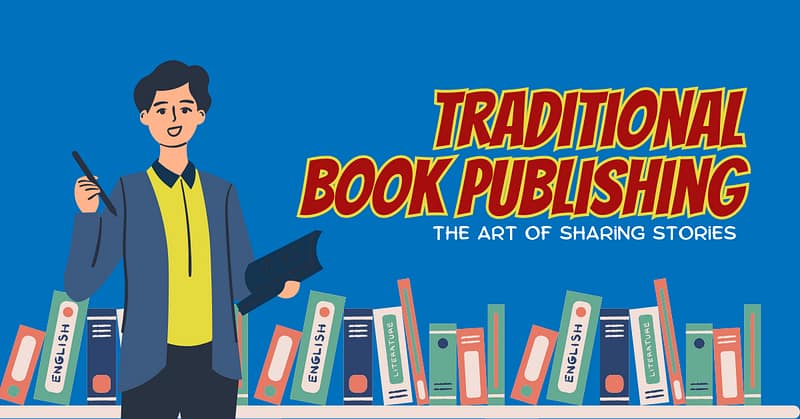Traditional book publishing is an age-old practice that has significantly shaped literature and shared stories with the world. It encompasses bringing a book to life, from writing and editing to designing and distributing. In this digital era, where self-publishing and online platforms have gained popularity, traditional book publishing remains a respected and esteemed avenue for authors to showcase their work. This article will explore the world of traditional book publishing, its importance, the process involved, and how it continues to evolve in the modern age.
Table of Contents
Traditional Book Publishing: A Journey through Time

The Origins of Traditional Book Publishing
Traditional book publishing has a rich history that dates back centuries. It originated with the invention of the printing press by Johannes Gutenberg in the 15th century, which revolutionized the way books were produced. This groundbreaking invention made it possible to mass-produce books, making them more accessible to the general public and facilitating the spread of knowledge and ideas.
The Impact of Traditional Book Publishing
Historically, traditional book publishing has shaped cultures, preserved knowledge, and fostered intellectual growth. Books have the power to entertain, educate, and inspire readers, offering a window into different worlds and perspectives. They serve as a medium for storytelling, enabling authors to share their ideas, experiences, and imagination with a wide audience.
Traditional Book Publishing in the Digital Age
In recent years, the rise of digital technologies has brought about significant changes in the publishing industry. E-books, audiobooks, and online platforms have become popular alternatives to traditional print books. However, traditional book publishing continues to hold its ground, as many readers still appreciate the tactile experience of holding a physical book and flipping through its pages. Furthermore, traditional publishers have adapted to the digital age by embracing e-books and leveraging online platforms to reach a wider audience.
The Traditional Book Publishing Process
Writing: Crafting Compelling Stories
At the heart of traditional book publishing lies the art of writing. Authors spend countless hours honing their craft, developing characters, and weaving intricate plots that captivate readers. The writing process involves research, outlining, drafting, revising, and polishing the manuscript until it reaches its full potential. A well-written book serves as the foundation for successful publishing.
Editing: Polishing the Gem
Once the manuscript is complete, the next crucial step is editing. Editing involves reviewing the manuscript for grammar, spelling, punctuation, and consistency. It also focuses on refining the story’s structure, character development, and coherence. Professional editors work closely with authors to ensure the book meets industry standards and resonates with readers.
Design: Bringing Words to Life
An aesthetically pleasing book design is essential to grab the attention of readers. Traditional book publishers collaborate with talented designers to create captivating covers, typography, and layouts that enhance the reading experience. The design process involves carefully selecting fonts, colors, and imagery that align with the book’s genre, tone, and target audience.
Production: Turning Manuscript into Book
Once the manuscript is edited and the design is finalized, production begins. This stage involves typesetting, printing, and binding the book. Skilled professionals work diligently to ensure the final product meets the highest quality standards. They pay attention to font size, line spacing, margins, and paper quality to create a visually appealing and readable book.
Distribution: Connecting Authors with Readers
Distribution is a crucial aspect of traditional book publishing. Publishers leverage their extensive networks and industry connections to ensure that books reach bookstores, libraries, and online retailers worldwide. They also handle the logistics of warehousing, shipping, and managing inventory. Through effective distribution, publishers make books available to a wide audience, maximizing their reach and potential impact.
Frequently Asked Questions (FAQs)
What is the advantage of traditional book publishing over self-publishing?
Traditional book publishing offers several advantages over self-publishing. Firstly, traditional publishers have established networks and industry connections that can significantly enhance an author’s visibility and reach. They have the expertise to guide authors through the entire publishing process, including editing, design, marketing, and distribution. Additionally, traditional publishers provide financial support through advances and royalties, assuming most of the financial risk associated with publishing.
How long does the traditional book publishing process typically take?
The timeline for traditional book publishing can vary depending on various factors, including the complexity of the book, the publisher’s schedule, and the editing and production requirements. The process can take several months to a year or more. Authors must understand that publishing is a meticulous process that requires time and patience to ensure the best possible outcome.
What role do literary agents play in traditional book publishing?
Literary agents act as intermediaries between authors and publishers. They help authors secure publishing deals, negotiate contracts, and advocate for their client’s interests. Literary agents possess industry knowledge and connections, making them invaluable assets for authors navigating the traditional book publishing landscape. They provide guidance, feedback, and representation throughout the publishing journey.
Is traditional book publishing still relevant in the digital age?
Absolutely! Traditional book publishing continues to thrive despite the digital revolution. While e-books and online platforms have gained popularity, many readers still cherish the experience of reading a physical book. Traditional publishers have adapted to the digital age by embracing e-books and leveraging online platforms to expand their readership. They also offer prestige and credibility valuable to authors seeking wider recognition.
How do traditional publishers select books for publication?
Traditional publishers receive numerous book submissions and carefully evaluate each to determine its market potential. They consider the book’s quality, uniqueness, market demand, and fit within their publishing catalog. Publishers have specific criteria and preferences; authors must research and target publishers that align with their genre and style.
Can self-published authors transition to traditional book publishing?
Yes, many self-published authors have successfully transitioned to traditional book publishing. Traditional publishers are open to acquiring rights to previously self-published books that demonstrate market demand and sales potential. However, self-published authors must approach traditional publishers strategically, showcasing their work’s success and potential while highlighting their target audience and marketing efforts.
Conclusion
Traditional book publishing continues to be a vital part of the literary landscape, providing authors a platform to share their stories and ideas with the world. Despite the rise of digital alternatives, traditional publishing offers unique benefits such as industry expertise, wide distribution networks, and the enduring appeal of physical books. By embracing the digital age while maintaining the core values of storytelling and craftsmanship, traditional book publishing remains a beacon of literary excellence.





